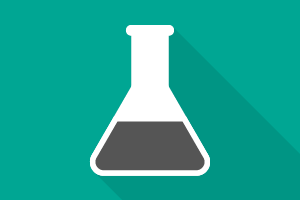Classroom Resources: Quantitative Chemistry
Filter by:
51 – 75 of 91 Classroom Resources
-

Density, Measurements | Elementary School, Middle School
Lab: Weight Just a Minute! Mark as Favorite (1 Favorite)
In this lab, students will learn how volume and mass affect density as they make comparisons and calculations.
-

Concentration, Mixtures, Interdisciplinary, Scientific Method, Measurements | Middle School, High School
Lab: Effect of Salt Concentration on Plants Mark as Favorite (9 Favorites)
In this lab, students will observe how salt concentration can affect the structure of a potato tuber.
-

Measurements, Dimensional Analysis, SI Units, Percent Composition, Scientific Notation, Significant Figures, Accuracy, Density | High School
Lesson Plan: Chemical Measurement Unit Plan Mark as Favorite (112 Favorites)
The AACT High School Classroom Resource library has everything you need to put together a unit plan for your classroom: lessons, activities, labs, projects, videos, simulations, and animations. We constructed a unit plan for introducing concepts student need to collect and use chemical measurements: Percent Composition, Metric Units, Accuracy and Precision, Percent Error, Density, Scientific Notation, Significant Figures, and Unit Conversion. This unit is designed to be used at beginning of the school year and modified based on student math abilities.
-

Significant Figures, Measurements, Accuracy, Density, Accuracy, Error Analysis, Error Analysis | Middle School, High School
Lab: Significant Figures and Lab Data Mark as Favorite (98 Favorites)
In this lesson, students will use laboratory equipment of different precision to collect data for several different metals, and then use the data to calculate the density of each. They will then compare their calculated densities to accepted values and determine the combination of equipment that leads to the most accurate calculation of density.
-

Density, Matter, Physical Properties, Measurements | Elementary School, Middle School, High School
Animation: Density Animation Mark as Favorite (43 Favorites)
This animation explores density on the particulate level. There are opportunities to make qualitative and quantitative comparisons between substances. **This video has no audio**
-

Conservation of Mass, History, Observations, Measurements, SI Units | Elementary School, Middle School, High School
Video: Antoine Lavoisier Video Mark as Favorite (18 Favorites)
This video tells the story of Antoine Lavoisier who many consider to be the father or modern chemistry. Lavoisier discovered oxygen and hydrogen and first proposed the Law of Conservation of Mass.
-

Mole Concept, Measurements, History, Ideal Gas, Gas Laws | High School
Video: Amedeo Avogadro Video Mark as Favorite (43 Favorites)
This video tells the story of Amedeo Avogadro, the scientist given credit for the mole concept, but who discovered other things in chemistry too.
-
Updated

Limiting Reactant, Percent Yield, Stoichiometry, Balancing Equations, Measurements, Observations, Error Analysis, Separating Mixtures, Error Analysis, Dimensional Analysis, Mole Concept | High School
Lab: Determining Limiting Reactant and Percent Yield Mark as Favorite (72 Favorites)
In this lab, students react copper(II) chloride with aluminum and determine the limiting reactant. They will identify the limiting reactant both theoretically through calculations and experimentally through their observations of the chemical reaction. They then determine which product to isolate to determine the percent yield of the reaction.
-

Titrations, Acid Base Reactions, Indicators, Chemical Change, Stoichiometry, Balancing Equations, Concentration, Molarity, Error Analysis, Dimensional Analysis, Measurements | High School
Lab: Vinegar Quality Control Mark as Favorite (39 Favorites)
In this lab, students will perform a titration of a vinegar sample to determine if it is it close to the concentration claimed on the bottle.
-

Mole Concept, Dimensional Analysis, Measurements, Molar Mass | High School
Lab: It's Mole Time! Mark as Favorite (147 Favorites)
In this lab, students determine the number of moles of chalk used to write their name, the moles of sucrose ingested while chewing gum, and the moles of alcohol evaporated when using hand sanitizer.
-

Density, Measurements, Graphing, Experimental Design, Scientific Method, Physical Properties, Error Analysis, Significant Figures, Error Analysis | High School
Lab: Investigating the Density of an Irregular Solid Object Mark as Favorite (36 Favorites)
In this lab, students will use common laboratory equipment to devise a method to measure the density of several irregular objects. They will then create a formal laboratory report using both their own data and data from the entire class.
-

Gas Laws, Sublimation, Ideal Gas, Volume, Temperature, Pressure, Density, Phase Changes, Interdisciplinary, Density, Physical Change, Mole Concept, Dimensional Analysis, Measurements | High School
Demonstration: Ideal Gas Law using Carbon Dioxide Mark as Favorite (15 Favorites)
In this demonstration, students observe dry ice sublime while the CO2 gas fills a balloon. They then calculate the moles and volume of CO2 produced.
-

Gas Laws, Percent Yield, Stoichiometry, Dimensional Analysis, Measurements, Error Analysis | High School
Lab: Ideal Gas Law Mark as Favorite (66 Favorites)
In this lab, students use the reaction of an antacid table with water to inflate a balloon. They then use the ideal gas law to determine the number of moles of gas produced by the reaction.
-

Calorimetry, Law of Conservation of Energy, Combustion, Heat of Combustion, Specific Heat, Heat, Exothermic & Endothermic, Bond Energy, Temperature, Measurements, Accuracy, Dimensional Analysis, Error Analysis | High School
Lab: How Much Energy is in Your Snack Food? Mark as Favorite (49 Favorites)
In this lab, students will find the amount of heat energy stored in foods and compare heat calories with food calories.
-

Heat of Neutralization, Acid Base Reactions, Exothermic & Endothermic, Temperature, Specific Heat, Calorimetry, Bond Energy, Net Ionic Equation, Molarity, Dimensional Analysis, Measurements, Mole Concept | High School
Lab: Heat of Neutralization Mark as Favorite (4 Favorites)
In this lab, students carry out an acid-base reaction to calculate the heat of neutralization based on experimental data. This lab will reinforce the concepts of exothermic and endothermic processes, system and surroundings, and heat of reaction (specifically, neutralization).
-

Density, Physical Properties, Graphing, Interdisciplinary, Observations, Error Analysis, Measurements, Error Analysis | High School
Lab: Graphing Density Mark as Favorite (31 Favorites)
In this lab, students will collect data and then use graphing to determine the density values of unknown metal samples.
-

Accuracy, Measurements, Error Analysis, Accuracy, Error Analysis | High School
Lab: Glassware Accuracy Mark as Favorite (72 Favorites)
In this lab, students use different types of laboratory glassware to measure 50 mL of water and determine the accuracy of each piece of glassware.
-

Balancing Equations, Limiting Reactant, Stoichiometry, Dimensional Analysis, Mole Concept, Measurements | High School
Activity: S'more Stoichiometry Mark as Favorite (61 Favorites)
In this activity, students determine the number of graham crackers and chocolate pieces required to complete a “reaction” with a given quantity of marshmallows (the limiting reactant). They then use the same thought process with a problem involving a real chemical reaction.
-

Density, Pressure, Temperature, Volume, Density, Error Analysis, Error Analysis, Measurements | High School
Lab: Gas Density and Relative Molecular Mass Mark as Favorite (3 Favorites)
In this lab, students will quantitatively determine the densities of four gases.
-

Classification of Reactions, Oxidation, Reduction, Percent Yield, Stoichiometry, Chemical Change, Redox Reaction, Activity Series, Error Analysis, Dimensional Analysis, Mole Concept, Measurements | High School
Lab: Extracting Copper From Ore Mark as Favorite (16 Favorites)
In this lab, students extract copper from copper carbonate using two different methods, and then determine which industrial method is most effective.
-

Gas Laws, Matter, Density, Density, Temperature, Pressure, Volume, Graphing, Observations, Measurements | High School, Middle School
Lab: Pressure Bottle Mark as Favorite (3 Favorites)
In this lab, students determine the relationship between volume and pressure of a gas and its temperature and address the common misconception that air does not have mass or density.
-

Percent Composition, Measurements | High School
Lab: Percent Composition Mark as Favorite (18 Favorites)
In this lab, students will calculate the percent composition of sugar in gum and the percent composition of water in popcorn kernels.
-

Measurements, Percent Composition | High School
Lab: Mineral Investigation Mark as Favorite (19 Favorites)
In this lab, students will put their problem solving skills to work as a team to determine how many specific samples of ore can be made from a lode equivalent to the size of their classroom. This lab is perfect for the start of the school year to engage students in real-life applications of chemistry, as well as essential mathematic and measurement skills.
-

Density, Observations, Inferences, Measurements, Identifying an Unknown, Error Analysis, Scientific Method | High School
Lab: Colors of the Rainbow Mark as Favorite (36 Favorites)
In this lab, students will practice density calculations and put their calculations to test by creating their own density column.
-

Catalysts, Reaction Rate, Experimental Design, Scientific Method, Chemical Change, Error Analysis, Balancing Equations, Percent Yield, Stoichiometry, Chemical Change, Measurements, Error Analysis, Dimensional Analysis | High School
Lesson Plan: Catalysis & Catalytic Converters Mark as Favorite (11 Favorites)
In this lesson students will be introduced to catalysts while expanding their knowledge of chemical reactions and stoichiometry. They will first learn about catalytic converters and then be challenged to create the best “catalytic converter” of hydrogen peroxide to oxygen gas in an inquiry-based activity.